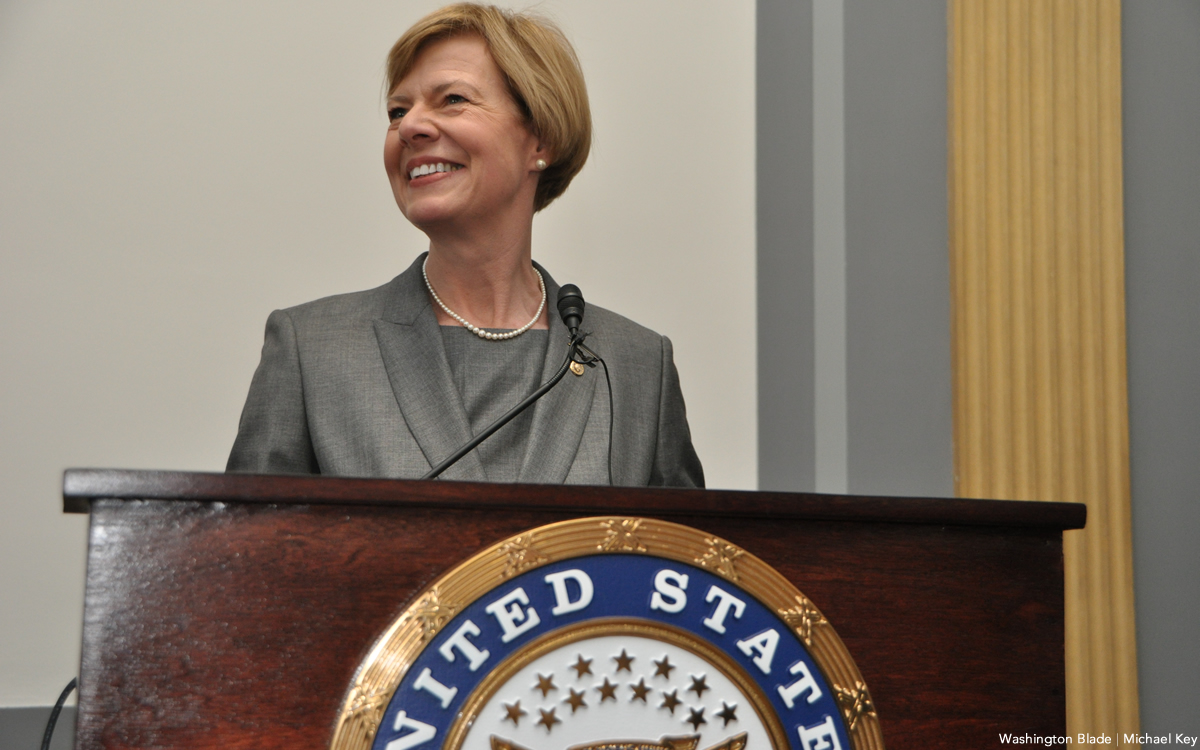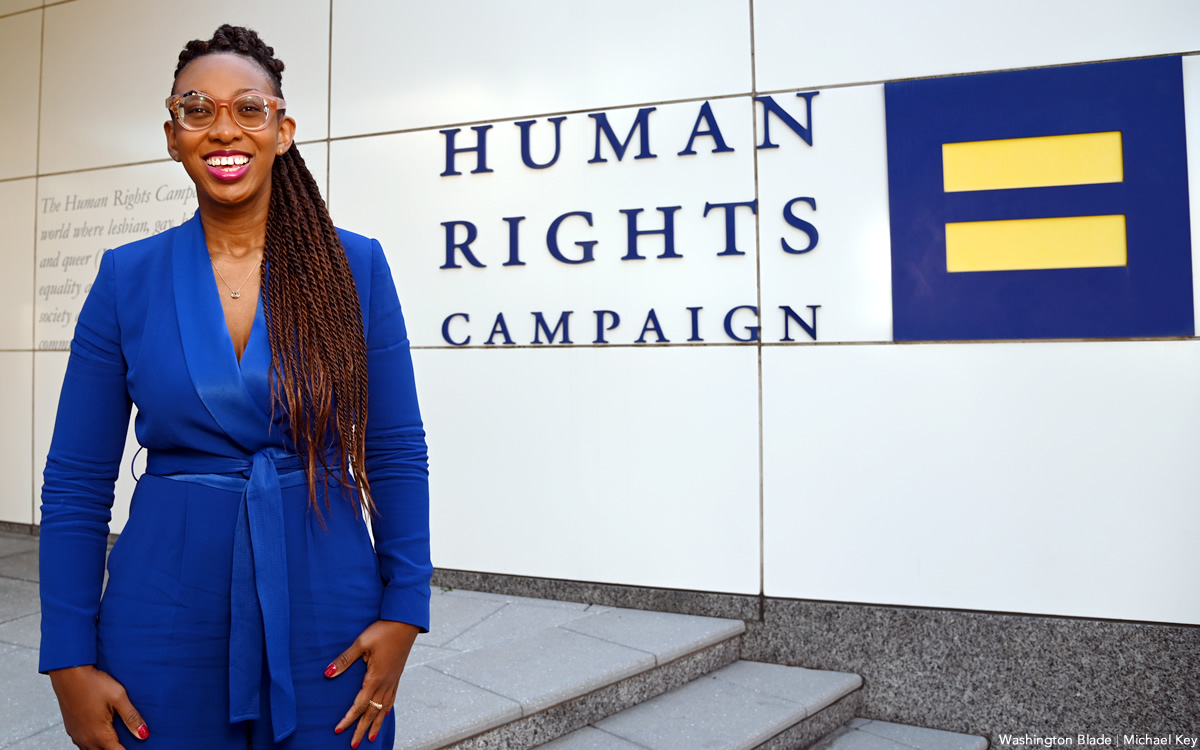News
Senate insiders bullish on marriage vote as summer recess nears
More than 10 Republicans possible ‘yes’ votes

Senate insiders are bullish on the prospect of a measure seeking to codify same-sex marriage after an unexpected bipartisan vote for the measure in the U.S. House as some predict lawmakers could find the 60 votes needed to end a filibuster and vote to send it to President Biden’s desk, although concerns remain about limited time on the congressional calendar.
With support for same-sex marriage at a record high — 7-in-10 Americans support gay nuptials — insiders told the Washington Blade the Senate could approve the Respect for Marriage Act with the 10 Republicans needed to end a filibuster — or even more. The major obstacles for the measure are finding a time period to put the bill up for a vote in the Senate, waiting for senators out with COVID to return to work, and rounding up enough Republican support.
One LGBTQ lobbyist, who agreed to speak on condition of anonymity, said “we’re in a good place” with votes on the measure, although whether or not 60 votes are present is hard to know until Senate Democratic leadership ultimately brings up the bill for a vote.
“I think this is one of those things where I think we are absolutely close, and I think we should move forward when we can, which I hoped would be really soon, ideally, to try to have a vote,” the lobbyist said.
Lawmakers approved the Respect for Marriage Act by a 267-157 vote, with 47 Republicans joining the unanimous Democratic caucus in supporting the legislation. One-fourth of the House Republican caucus voted for the measure, dubbed the Respect for Marriage Act. The measure would need a smaller share of Republicans in the Senate, one-fourth, to obtain the 60 votes necessary to end a filibuster in the chamber.
Sen. Tammy Baldwin (D-Wis.), the first out lesbian senator, was the subject of a recent profile in Politico and was quoted as saying she has spoken to at least 10 Republican senators. One LGBTQ lobbyist said Sen. Dianne Feinstein (D-Wis.), the sponsor of the bill in the Senate, is active in the lobbying process through notes to her staff. Sen. Susan Collins (R-Maine), an original co-sponsor of the measure, and Sen. Rob Portman (R-Ohio), who has a gay son and was an early Republican supporter of same-sex marriage, are taking an active role in lobbying the Republican caucus, insiders said.
In addition to Collins and Portman, a handful of Republicans have declared support for the Respect for Marriage Act, including Sen. Thom Tillis (R-N.C), who once voted for same-sex partner benefits; and Sen. Lisa Murkowski (R-Alaska), who has supported LGBTQ rights measures in the past. A fifth and unlikely Republican, Sen. Ron Johnson (R-Wis.), has said he sees “no reason to oppose the measure.”
Other Republicans have been non-committal, such as Sen. Mitt Romney (R-Utah), who has a reputation as a moderate, but years ago was once a champion of a proposed constitutional amendment that would have banned same-sex marriage nationwide, or announced they would oppose the measure, such as Sen. Marco Rubio (R-Fla.), who pointedly called the measure a “stupid waste of time” and Sen. Lindsey Graham (R-S.C.). One Republican, Sen. Tommy Tuberville (R-Ala.), surprisingly told reporters he’s OK with same-sex marriage, but hasn’t indicated specifically which way he’ll come down on the bill.
Romney, despite his history of opposition to same-sex marriage, may be in play, one LGBTQ lobbyist said, given his new image as a moderate and getting breathing space from Utah lawmakers in the House who were among the 47 Republicans to vote for the Respect for Marriage Act. Other potential votes identified are Sens. Joni Ernst (R-Iowa), Pat Toomey (R-Pa.), Richard Burr (R-N.C.) and Shelly Moore Capito (R-W.Va.).
Complicating matters is that a number of senators are out sick. Murkowski and Sen. Joe Manchin (D-W.Va.) have been out after contracting COVID, while Sen. Patrick Leahy (D-Vt.), the longest-serving member of the Senate, has been out with a fractured hip he suffered from a fall at his house in McLean, Va. One Republican insider said there is an effort to schedule a vote in the Senate, but that was scrapped with the number of senators absent, although another LGBTQ insider pushed back on that and said a vote may still happen this week.
Senate Majority Leader Charles Schumer (D-N.Y.), following the bipartisan vote for the Respect for Marriage Act in the House, expressed interest on the Senate floor in bringing the measure up for a vote, although he hasn’t specified any time as lawmakers are preparing to exit for the August recess. A Schumer spokesperson said he didn’t have a timing update and referred the Blade to the senator’s public remarks on the measure.
Time, however, is running out. Not only is the calendar limited before Congress adjourns for August recess, but one LGBTQ lobbyist said time is not on the side of Respect for Marriage Act as social conservatives are beginning to mount aggressive campaigns against the measure.
Schumer, asked about the Respect for Marriage Act during a weekly reporter stakeout Tuesday, said “yes” in response to a question on whether the bill remains a priority before Congress adjourns for August recess.
“OK, the bottom line is that we care very much about the Equality Act, the Marriage Equality Act,” Schumer added. “We are trying, working real hard to get 10 Republican senators. Between that and the illnesses, we’re not there yet.”
Dangerous amendments also remain a possibility. Unlike the House, which proceeded with the Respect for Marriage Act under a closed rule, the same option isn’t available in the Senate, where proposed amendments are determined by agreement among caucus leaders. One LGBTQ lobbyist, however, downplayed the threat of amendments, saying there may be some that would be acceptable if they would win the vote of additional supporters while objectionable changes could be voted down with bipartisan support.
The measure is advancing through Congress amid fears same-sex marriage is under threat after the U.S. Supreme Court overturned Roe v. Wade, when U.S. Associate Justice Clarence Thomas writing in a concurrence he’d like to revisit the the Obergefell decision along with the Lawrence v. Texas and Griswold v. Connecticut cases. No other justices signed Thomas’s concurrence, nor is any state legislature or court case advancing a challenge to marriage rights for same-sex couples.
The Respect for Marriage Act wouldn’t keep same-sex marriage the law of the land if the Supreme Court were to strike down Obergefell per se, but rather repeal from the books the Defense of Marriage Act, which the Supreme Court struck down in 2013, and require states to recognize same-sex marriages performed elsewhere. There would be constitutional issues if Congress required states to accommodate same-sex couples in their marriage laws, which have been under the jurisdiction of the states.
The marriage bill, which would codify existing law and make no additional changes, has momentum and is poised for a vote in the Senate, while the Equality Act, a measure that would expand long-sought after non-discrimination protections in federal law, remains pending in the chamber and is all but dead. No Republican support currently exists for the Equality Act, unlike the Respect for Marriage Act.
One LGBTQ lobbyist said anytime a LGBTQ rights measure like the Respect for Marriage Act gets a win, it can only have a positive impact on other measures, but was ultimately circumspect about expressing optimism for any prospects for a non-discrimination bill.
“As far as the clock on this Congress, we don’t have a lot of time left,” the lobbyist said. “While I think we were getting closer to 60 on something on non-discrimination protections, maybe not the full Equality Act, it’s hard to see the time working in our favor for this Congress, but I do think this vote in broad strokes helps us.”
Politics
HRC slams White House over position opposing gender affirming surgeries for minors
‘Biden administration is flat wrong on this’

Human Rights Campaign President Kelley Robinson issued a strong rebuke on Tuesday of the Biden-Harris administration’s position opposing gender affirming surgeries for minors.
The New York Times reported on June 28 that the White House, which broadly supports making medical interventions available for transgender youth, had expressed opposition to surgeries for patients under 18, having previously declined to take a specific position on the question.
“Health care decisions for young people belong between a patient, their family, and their health care provider. Trans youth are no exception,” Robinson responded.
“The Biden administration is flat wrong on this. It’s wrong on the science and wrong on the substance. It’s also inconsistent with other steps the administration has taken to support transgender youth. The Biden administration, and every elected official, need to leave these decisions to families, doctors and patients—where they belong,” she added. “Although transgender young people make up an extremely small percentage of youth in this country, the care they receive is based on decades of clinical research and is backed by every major medical association in the U.S. representing over 1.3 million doctors.”
Robinson said the “administration has committed to fight any ban on healthcare for transgender youth and must continue this without hesitation—the entire community is watching.”
“No parent should ever be put in the position where they and their doctor agree on one course of action, supported by the overwhelming majority of medical experts, but the government forbids it,” she added.
HRC is a prominent backer of Biden’s 2024 reelection campaign, having pledged $15 million to support efforts in six battleground states. The organization has a strong relationship with the White House, with the president and first lady headlining last year’s National Dinner.
A White House spokesperson declined to respond to Robinson’s statement.
Campaign for Southern Equality President Allison Scott also issued a statement.
“This is a cowardly statement from an administration that promised to support transgender people. It is a troubling concession to the right-wing assault on transgender Americans, falling for their false narratives about surgical care and betraying a commitment to equality and trust in the medical community,” said Scott.
“Let’s be very, very clear: Government has no business inserting itself into private medical decisions that should be exclusively between patients, their providers, and the patients’ parent or guardian,” Scott added.
“It is dangerous to begin endorsing categorical bans or limits on healthcare, and there is no justification for restricting transgender youth’s access to the very same care that many cisgender youth receive every year — that’s literally the definition of discrimination,” Scott concluded. “We demand the Biden administration retract this thoughtless statement and work to undo its damage.”
Virginia
Parades, community events held to mark Pride Month in Va.
Upwards of 30,000 people attended PrideFest in Norfolk on June 22

Activists across Virginia last month held a series of events to mark Pride Month.
Hampton Roads Pride, a volunteer-run organization founded in 1997, held 37 different Pride events throughout the region in June.
Their biggest event, PrideFest, which is part of their larger three day event, Pride Weekend, celebrated its 36th anniversary on June 22. Pride Weekend took place from June 21-23 and began with a block party at NorVa in Norfolk.
PrideFest took place at Town Point Park, and an estimated 30,000 people attended. More than 70 venders participated, while Todrick Hall and Mariah Counts are among those who performed.
Another PrideFest event with a DJ in the afternoon and live music at night took place in Virginia Beach on June 23. Congressman Bobby Scott and U.S. Sen. Tim Kaine (D-Va.) are among those who attended Pride events in Suffolk on June 30.
Norfolk Mayor Kenneth Alexander, along with members of the Norfolk and Virginia Beach City Councils, also attended the Pride events in their respective cities. Jamar Walker, the first openly gay federal judge in Virginia, also took part.
“You know people all throughout Pride Month, at all of our various events, tell me all kinds of stories about their own experiences and the past of this community … and some of our older folks especially, remember when we couldn’t have this,” Hampton Roads Pride President Jeff Ryder told the Washington Blade on Monday during a telephone interview.
“It was a great year,” he added. “It was a big achievement for us to have unique celebrations in each of our seven communities. Each of these cities is so different from one another, but to be able to create a Pride celebration that’s unique in each of those places was really great, and I think really well received by folks who may not have felt represented previously. We’re always trying to do better, to embrace every aspect of our community, and take a big step forward there this year.”
State Dels. Adele McClure (D-Arlington County) and Alfonso Lopez (D-Arlington County) are among those who spoke at Arlington Pride that took place at Long Bridge Park on June 29. The Fredericksburg Pride march and festival took place the same day at Riverfront Park in Fredericksburg.
Republican Virginia Gov. Glenn Youngkin on June 10 hosted a Pride Month reception in Richmond.
Youngkin in previous years has hosted Pride Month receptions, even though Equality Virginia and other advocacy groups have criticized him for supporting anti-LGBTQ bills.
The Republican governor in March signed a bill that codified marriage equality in Virginia. Youngkin last month vetoed a measure that would have expanded the definition of bullying in the state.
U.S. Supreme Court
Concern over marriage equality in US grows two decades after first Mass. same-sex weddings
Gay and lesbian couples began to marry in Bay State in 2004

Two decades after Massachusetts became the first state to legalize same-sex marriage, a new study reveals both significant progress and ongoing challenges for married LGBTQ couples in the U.S., with a growing sense of insecurity about the future of their rights.
The Williams Institute at UCLA School of Law surveyed 484 married same-sex couples from all 50 states and D.C. The study, released Monday, marks the 20th anniversary of legal same-sex marriage in the U.S.
Researchers found that 93 percent of respondents cited love as a primary reason for marrying, with 75 percent also mentioning legal protections. Over 83 percent reported positive changes in their sense of security, and 74.6 percent noted improved life satisfaction since marrying.
However, the study also highlighted persistent discrimination and growing concerns about the future. About 11 percent of couples who had a wedding reported facing prejudice during the planning process.
Alarmingly, nearly 80 percent of respondents expressed concern about the potential overturning of the 2015 Obergefell v. Hodges decision, which legalized same-sex marriage nationwide. This anxiety has been exacerbated by initiatives like Project 2025, a conservative policy blueprint that some fear could roll back LGBTQ rights if implemented.
The possibility of a former President Donald Trump victory in the upcoming election has further intensified these concerns. Many respondents cited Trump’s previous U.S. Supreme Court appointments and his statements on LGBTQ issues as reasons for their apprehension. One participant stated, “The thought of another Trump presidency keeps me up at night. We’ve come so far, but it feels like our rights could be stripped away at any moment.”
The current political climate has 29 percent of respondents considering moving to another state, with 52.9 percent citing socio-political concerns as a primary reason. This reflects a growing sense of insecurity among LGBTQ couples about their rights and freedoms.
Brad Sears, founding executive director of the Williams Institute, noted, “The data clearly show that marriage equality has had a profound positive impact on same-sex couples and their families. However, it also reveals ongoing challenges and serious concerns about the future of these rights in light of current political trends and the upcoming election.”
Christy Mallory, legal director at the Williams Institute and lead author of the study, added, “This research provides crucial insights into the lived experiences of same-sex couples two decades after marriage equality began in the U.S. The high level of concern about potential loss of rights underscores the continued importance of legal protections and public support for LGBTQ+ equality.”
The study found that 30 percent of surveyed couples have children, with 58.1 percent of those parents reporting that marriage provided more stability for their families. However, many of these families now worry about the security of their legal status in the face of potential policy changes and shifting political landscapes.
As the nation reflects on two decades of marriage equality, the study underscores both the transformative power of legal recognition and the ongoing need for vigilance in protecting LGBTQ+ rights. The findings highlight the complex reality faced by same-sex couples in America today: Celebrating hard-won progress while grappling with uncertainty about the future, particularly in light of upcoming political events and potential shifts in leadership.
-

 Canada1 day ago
Canada1 day agoToronto Pride parade cancelled after pro-Palestinian protesters disrupt it
-

 Theater4 days ago
Theater4 days agoStephen Mark Lukas makes sublime turn in ‘Funny Girl’
-

 Baltimore3 days ago
Baltimore3 days agoDespite record crowds, Baltimore Pride’s LGBTQ critics say organizers dropped the ball
-

 Sports4 days ago
Sports4 days agoHaters troll official Olympics Instagram for celebrating gay athlete and boyfriend









